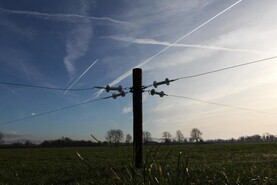Minister for Foreign Affairs Simon Coveney has said the UK move to publish legislation that would override parts of the Brexit withdrawal agreement has “backfired fairly spectacularly”, he told the annual Agricultural Science Association (ASA) conference on Friday morning.
“I think it was an effort this week to certainly take a strategic approach that was more focused on domestic British politics than anything else,” said Minister Coveney.
“I think it's a dangerous approach by Britain, because the EU has been really unimpressed by it on a number of levels.”
Tension
Minister Coveney described Boris Johnson’s move as a deliberate strategy to create tension in an effort to derive some advantage for the UK on issues it is seeking concessions on.
He added: “My reading of it from the EU side is that it has backfired fairly spectacularly.”
However, he added that the EU has been “pretty calm” in its response.
No one's calling for a break off of negotiations
“There's been nothing hysterical, no one's calling for a break off of negotiations immediately or anything like that.”
The Minister said that events of the past week were a “a real departure from where we've been in the last few years” in terms of the UK’s approach - firstly, by breaching the agreement it had signed up to and pass legislation for an international law, but secondly, the way in which it was done – without any of the usual diplomatic choreography in which governments are given an early indication that something big was about to happen.
“This week, we got nothing - no calls, no emails, no heads-up, nothing,” Coveney told the ASA conference chair Damien O’Reilly.
“Instead, we read a headline in the Financial Times. We got briefings through Number 10. And obviously, our embassy in London were really anxious to try to find out what the hell is going on here, was this real?” he said.
€1.5bn tariff threat
However, Coveney said the Irish position remains to focus on the “bigger prize” of avoiding a no-deal Brexit, which would cost Irish food and drink exports between €1.3bn and €1.5bn in tariffs.
“Even though people have been taken aback by the UK approach...there will be negotiations next week in Brussels that will involve the task force and David Frost's team on the UK side.
"And we will try to continue to focus on the bigger prize here, which is to avoid a no deal by the end of the year.”
He again reiterated that the biggest cost of a no-deal Brexit would be carried by the Irish beef and dairy industries, with beef more exposed than all.
"Irish products and EU products generally in British supermarkets would just become more expensive in the short term.
"But in the medium term, this is going to put a significant downward pressure on price because British consumers won't like that.
"And it's going to create, in the medium term, real problems around cost competitiveness, because the UK will look for other sources of cheaper food, cheaper meat in particular, and dairy products from other parts of the world. And that's not what we want.
"There's no point in sugarcoating this; this is a real danger for the Irish agriculture industry, particularly for the beef sector, because I think dairy has more options in terms of alternative markets."
Is a deal still possible?
Coveney said the best case scenario, in his view, that can be achieved before the end of the year would be “a very basic and pretty thin trade agreement that avoids tariffs and quotas, that has a level playing field agreed…and a fisheries agreement that both sides can sign up to, I think that is sort of bare bones.”
He said he believed that much was “achievable”, while temporary solutions will be needed for a whole range of other things and discussions would continue into next year for more permanent solutions on things such as road haulage and the land bridge across the UK.
€5bn Brexit compensation fund
Pressed by chair Damian O’Reilly if the unforeseen coronavirus pandemic would affect the just transition compensation fund available to countries affected by Brexit, Minister Coveney insisted that the fund was safe.
“There's a €5bn fund, which is part of the multi-annual financial framework negotiations which has been agreed. We don’t know how that money is to be spent, it’s not decided yet.
"It's not earmarked, but certainly the understanding is that the countries that would be most impacted by the downside of Brexit are the ones that will be accessing the majority of that money.
“That means the Netherlands, Belgium, France, Ireland, but Ireland is the first in the queue actually rather than the others,” he insisted.
“Countries that have significant trade, and will therefore have significant trade disruption with the UK in the absence of a deal, are the ones that that fund is earmarked for and we've worked hard to make sure that that fund is in place,” he said.
Read more
Agriculture's 10-year road map due in coming months - Taoiseach
Down to Agribusiness Podcast: Brexit brinksmanship and PGI status for Irish beef
Minister for Foreign Affairs Simon Coveney has said the UK move to publish legislation that would override parts of the Brexit withdrawal agreement has “backfired fairly spectacularly”, he told the annual Agricultural Science Association (ASA) conference on Friday morning.
“I think it was an effort this week to certainly take a strategic approach that was more focused on domestic British politics than anything else,” said Minister Coveney.
“I think it's a dangerous approach by Britain, because the EU has been really unimpressed by it on a number of levels.”
Tension
Minister Coveney described Boris Johnson’s move as a deliberate strategy to create tension in an effort to derive some advantage for the UK on issues it is seeking concessions on.
He added: “My reading of it from the EU side is that it has backfired fairly spectacularly.”
However, he added that the EU has been “pretty calm” in its response.
No one's calling for a break off of negotiations
“There's been nothing hysterical, no one's calling for a break off of negotiations immediately or anything like that.”
The Minister said that events of the past week were a “a real departure from where we've been in the last few years” in terms of the UK’s approach - firstly, by breaching the agreement it had signed up to and pass legislation for an international law, but secondly, the way in which it was done – without any of the usual diplomatic choreography in which governments are given an early indication that something big was about to happen.
“This week, we got nothing - no calls, no emails, no heads-up, nothing,” Coveney told the ASA conference chair Damien O’Reilly.
“Instead, we read a headline in the Financial Times. We got briefings through Number 10. And obviously, our embassy in London were really anxious to try to find out what the hell is going on here, was this real?” he said.
€1.5bn tariff threat
However, Coveney said the Irish position remains to focus on the “bigger prize” of avoiding a no-deal Brexit, which would cost Irish food and drink exports between €1.3bn and €1.5bn in tariffs.
“Even though people have been taken aback by the UK approach...there will be negotiations next week in Brussels that will involve the task force and David Frost's team on the UK side.
"And we will try to continue to focus on the bigger prize here, which is to avoid a no deal by the end of the year.”
He again reiterated that the biggest cost of a no-deal Brexit would be carried by the Irish beef and dairy industries, with beef more exposed than all.
"Irish products and EU products generally in British supermarkets would just become more expensive in the short term.
"But in the medium term, this is going to put a significant downward pressure on price because British consumers won't like that.
"And it's going to create, in the medium term, real problems around cost competitiveness, because the UK will look for other sources of cheaper food, cheaper meat in particular, and dairy products from other parts of the world. And that's not what we want.
"There's no point in sugarcoating this; this is a real danger for the Irish agriculture industry, particularly for the beef sector, because I think dairy has more options in terms of alternative markets."
Is a deal still possible?
Coveney said the best case scenario, in his view, that can be achieved before the end of the year would be “a very basic and pretty thin trade agreement that avoids tariffs and quotas, that has a level playing field agreed…and a fisheries agreement that both sides can sign up to, I think that is sort of bare bones.”
He said he believed that much was “achievable”, while temporary solutions will be needed for a whole range of other things and discussions would continue into next year for more permanent solutions on things such as road haulage and the land bridge across the UK.
€5bn Brexit compensation fund
Pressed by chair Damian O’Reilly if the unforeseen coronavirus pandemic would affect the just transition compensation fund available to countries affected by Brexit, Minister Coveney insisted that the fund was safe.
“There's a €5bn fund, which is part of the multi-annual financial framework negotiations which has been agreed. We don’t know how that money is to be spent, it’s not decided yet.
"It's not earmarked, but certainly the understanding is that the countries that would be most impacted by the downside of Brexit are the ones that will be accessing the majority of that money.
“That means the Netherlands, Belgium, France, Ireland, but Ireland is the first in the queue actually rather than the others,” he insisted.
“Countries that have significant trade, and will therefore have significant trade disruption with the UK in the absence of a deal, are the ones that that fund is earmarked for and we've worked hard to make sure that that fund is in place,” he said.
Read more
Agriculture's 10-year road map due in coming months - Taoiseach
Down to Agribusiness Podcast: Brexit brinksmanship and PGI status for Irish beef






 This is a subscriber-only article
This is a subscriber-only article










SHARING OPTIONS: